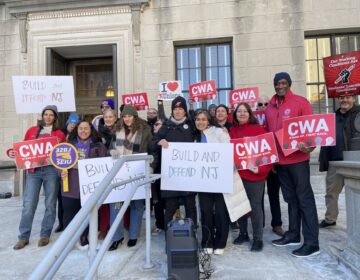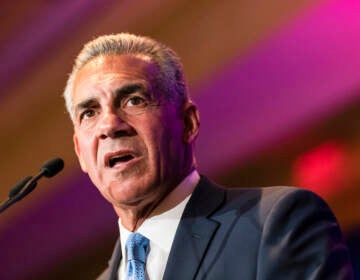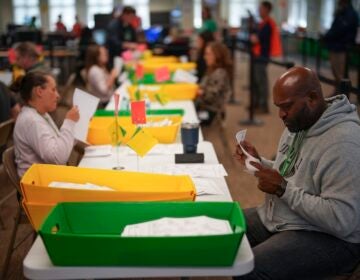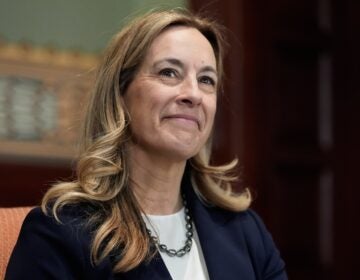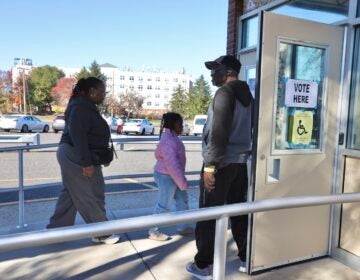Affordability, transit and school funding: New Jersey’s Democratic candidates for governor debate — and agree — on wide range of issues
Democratic candidates vying to become the Garden State’s next governor agree that costs must be lowered, immigrants must be protected and government must spend smarter.
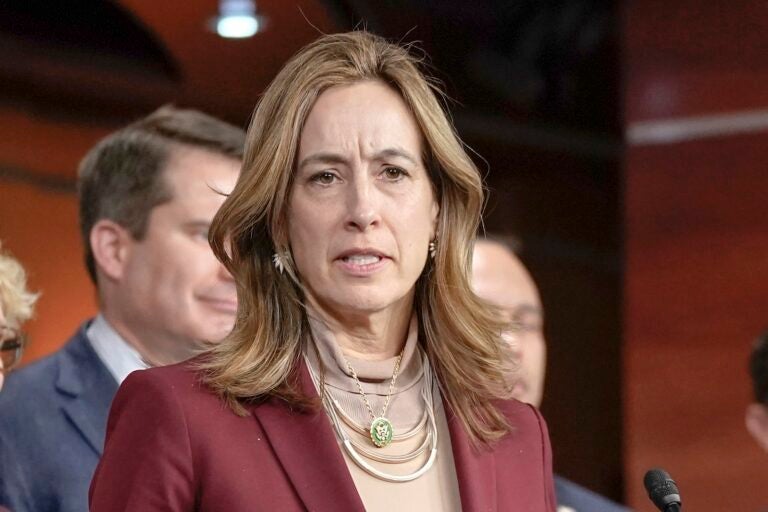
Rep. Mikie Sherrill, D-N.J., speaks during a news conference on Capitol Hill, Feb. 13, 2024, in Washington. (AP Photo/Mariam Zuhaib, File)
From Camden and Cherry Hill to Trenton and the Jersey Shore, what about life in New Jersey do you want WHYY News to cover? Let us know.
The general election is still more than nine months away, but the race for governor is already heating up in New Jersey.
Six candidates gathered to debate the issues Sunday night in the race for the Democratic gubernatorial nomination.
Newark Mayor Ras Baraka, Jersey City Mayor Steve Fulop, Rep. Josh Gottheimer, Rep. Mikie Sherrill, New Jersey Education Association President Sean Spiller and former Senate President Steve Sweeney participated in the wide-ranging one-hour and 45-minute debate at Rider University in Lawrenceville.
While the candidates mostly agreed on the issues, including the need to make life in the Garden State less expensive, North Jersey Congressman Josh Gottheimer pointed out that affordability for all residents is the leading issue in the state.
“Jersey is just too damn expensive; between property taxes and child care costs and the cost of food and healthcare and utility bills. It’s killing us,” he said.
Newark Mayor Ras Baraka said we must do better for working families, noting, “if the prices go up, we’re going to be paying more. Reduce prices, reduce costs, make spending efficient.”
Throughout the evening, all of the candidates talked about the need to take action and fight to protect Garden State residents, including immigrants, and to make state government more responsive.
Jersey City Mayor Steve Fulop said there is no accountability in Trenton.
“The structure is from these political bosses that control it and have monetized the system for themselves,” he said. “Of course, giving the opportunity to regular people to put initiatives and ballot referendums out there is a positive; it encourages more democracy.”
New Jersey Congresswoman Mikie Sherrill stressed the importance of fixing NJ Transit.
“We’ve just been through the third summer of hell, and I think we need innovative ways as we look forward to how we are going to fund this, how people are going to have a better rail experience, but also a better experience on our roads and in our bus services,” she said.
When asked what letter grade NJ Transit should get, all candidates agreed the rating should be “F.”
“New Jersey Transit is a wreck, too many people depend on it. It needs to be fixed,” said Steve Sweeney.
All candidates agreed New Jersey’s school funding formula must be improved to avoid unexpected funding, staffing and program cuts with little warning.
But Newark Mayor Baraka said the root of the issue must be addressed.
“There’s too many districts, we have too many superintendents, we have more districts than we actually have mayors, we need to be talking about unified school districts,” he said. “We have to get rid of segregation and integrate our schools, so kids can be in these seats, and we can get more money to municipalities, that’s the bottom line.”
NJEA president Sean Spiller agreed changes must be made.
“You can’t have a space where you reduce the aid by such an amount that all of a sudden the services that so many rely on are pulled out from under their feet,” he said. “What cannot be the solution is we’re going to have it [the aid] reduced at such a level that you’ve got students in those classrooms who don’t get to take the courses they need.”
All six candidates agreed the state must continue to fully fund the public sector pension system, make pre-K universal, demand more federal support and look for innovative ways to save money and not raise property taxes.
But Sweeney said, “We’ve got to fix our own problem because Washington is not going to help us.” He continued, “We cannot expect Washington to bail us out … we have to balance a budget year in and year out; it’s a different animal.”
The candidates also agreed on the need to build more affordable housing in New Jersey, support programs and policies that guarantee clean and safe drinking water in all parts of the state and support transgender rights.
Recent polls show most New Jersey voters are undecided about which Democratic candidate for governor they support, but Rep. Mikie Sherrill holds a slight edge right now.
The Democratic debate was sponsored by the New Jersey Globe, On New Jersey and the Rebovich Institute for New Jersey Politics at Rider University.
A Republican gubernatorial debate that will feature State Sen. Jon Bramnick, former Assemblyman Jack Ciattarelli, former state Sen. Ed Durr and former radio host Bill Spadea will take place at Rider University on Tuesday, Feb. 4 at 7 p.m.

Get daily updates from WHYY News!
WHYY is your source for fact-based, in-depth journalism and information. As a nonprofit organization, we rely on financial support from readers like you. Please give today.



